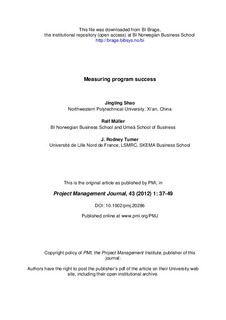| dc.contributor.author | Shao, Jingting | |
| dc.contributor.author | Müller, Ralf | |
| dc.contributor.author | Turner, Rodney J. | |
| dc.date.accessioned | 2016-08-02T13:15:14Z | |
| dc.date.accessioned | 2016-08-23T13:28:58Z | |
| dc.date.available | 2016-08-02T13:15:14Z | |
| dc.date.available | 2016-08-23T13:28:58Z | |
| dc.date.issued | 2012 | |
| dc.identifier.citation | Project Management Journal 2012, 43(1):37-49 | nb_NO |
| dc.identifier.issn | 8756-9728 | |
| dc.identifier.uri | http://hdl.handle.net/11250/2401158 | |
| dc.description | This is the original article as published by PMI | nb_NO |
| dc.description.abstract | Growth in the use of programs has led to a requirement of understanding what constitute program success. A measurement construct for program success, which comprises four dimensions, namely, delivery capability, organizational capability, marketing capability and innovative capability was developed based on 172 responses to a worldwide web-based questionnaire to program managers. Analysis of variance (ANOVA) and canonical correlation analysis were applied to test for the relationship between program success and program context. Results showed that the measurement construct for program success was stable over different types of program contexts. It provides a tool for further investigation into program success assessment. | nb_NO |
| dc.language.iso | eng | nb_NO |
| dc.publisher | PMI, Project Management Institute | nb_NO |
| dc.title | Measuring program success | nb_NO |
| dc.type | Journal article | nb_NO |
| dc.type | Peer reviewed | nb_NO |
| dc.date.updated | 2016-08-02T13:15:14Z | |
| dc.source.journal | Project Management Journal | nb_NO |
| dc.identifier.doi | 10.1002/pmj.20286 | |
| dc.identifier.cristin | 924014 | |
| dc.description.localcode | 1, Forlagsversjon | nb_NO |
